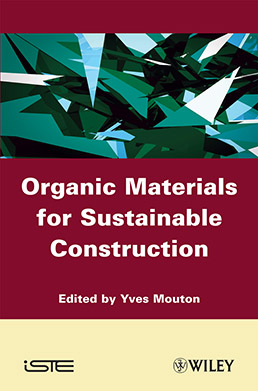
Using organic materials to build – geosynthetics for foundations, synthetic materials for distribution networks, polymer concrete or polymer cement concrete for joining and repairing, bitumens for roads or waterproofing, rubber for joining structures subjected to dynamic stresses, industrial high performance wood for light structures or even creating works of art, composites to realize innovative shaping structures, special admixtures allowing concrete technology to develop new performances, etc. – is all a part of sustainable development.
This assertion, which would have caused a scandal 50 years ago, has now become commonplace, but needs to be supported by a good knowledge of those materials, of their potential performances and their possible impact upon the environment, both during implementation and service life. This is the challenge which the 35 authors of this book take on.
Written by teachers, researchers, experts and entrepreneurs, this book provides an in-depth discussion of the aspects in the field of construction using organic materials, including organic polymers as building materials, manufactured products, composites, architectural textiles and industrial wood, organic binder-based materials, and organic compounds built-in into cement matrices, amongst many others.
Part 1. Problems Regarding Organic Materials and
Sustainable Development
1. Organic materials used in Construction at the Dawn of
the Third Millennium, Michel de Longcamp and Yves Mouton.
2. Sustainable Development Issues Regarding Organic
Materials used in Civil Engineering, Agnès Jullien.
3. Health Risks of Organic Materials used in Construction: What is the Situation Today?, Guy Auburtin.
4. Ecological Impacts of Organic Construction Materials: What is the Situation Today?, Yves Perrodin.
Part 2. Organic Polymers as Building Materials
5. Organic Polymers, Jacques Verdu and Bruno Fayolle.
6. Formulation of Plastics, Michel de Longcamp.
7. Ageing and Durability of Organic Polymers, Jacques Verdu and Bruno Fayolle.
8. Fireproofing Polymeric Materials: Problems and Solutions, Serge Bourbigot.
9. Organic Materials, Waste and Recycling, Vincent Verney.
Part 3. Manufactured Products
10. Geosynthetics and Waterproofing, Philippe Mestat.
11. Waterproofing Buildings: The Point of View of an Expert, Gérard Hémond.
12. Elastomers and Rubbers used in Civil Engineering, Michel Fragnet.
Part 4. Composite Materials, Tensile Structures, Textile Architecture and Timber
13. Composite Materials and Construction, Jean-François Caron.
14. Textile Materials: Architectural Applications, Bernard Maurin and Romain Ferrari.
15. Wood, Rémy Mouterde.
Part 5. Organic Binder-based Materials
16. Bitumen, Road Construction and Sustainable Development, Bernard Lombardi.
17. Industrial Mortars and Repairing Concrete Products, Pierre Boulanger and Paulo Goncalo.
18. Waterborne Paints to Limit VOC Emissions: Interests and Limits, Emmanuel Aragon and André Margaillan.
Part 6. Organic Compounds Built-in into Cement Matrices
19. Rheological Admixtures, Nicolas Roussel.
20. Contributions of Organic Admixtures in Construction Processes, François Cussigh.
21. Organic Fibers in Cementitious Materials, Laetitia d’Aloia-Schwartzentruber.
Part 7. Problems Specific to Organic Materials: Adhesive
Bonding and Characterization Methods
22. Adhesive Bonding, a Method for Construction, Thierry Chaussadent.
23. Strengthening Concrete Structures by Externally Bonded Composite Materials, Marc Quiertant.
24. Durability of FRP Strengthened Concrete Specimens under Accelerated Ageing, Karim Benzarti, Marc Quiertant, Sylvain Chataigner and Christophe Aubagnac.
25. Characterization of Organic Materials used in Civil
Engineering by Chemical and Physico-chemical Methods, Fabienne Farcas.
Part 8. Organic Materials, Construction, Architecture,
Creation and Sustainable Development
26. Organic Materials and Sustainable Architectural Design, Michel Paulin.
27. Specific Contributions of Viscous Behavior Materials in Construction, Bernard Halphen.
28. Organics in Construction – How Far?, Henri Van Damme.
29. Thoughts on the Futurology in Research and Development of Innovative Materials, Jean Billard.
Yves Mouton is a chemical engineer and a specialist in civil engineering. He has been active for nearly 40 years at the LCPC (Central Laboratory for Structures and Roads) in Paris and as a Professor of Materials Science at the ENTPE (State national school of public works). He now heads ORGAGEC, an association devoted to the knowledge of organic materials in construction.